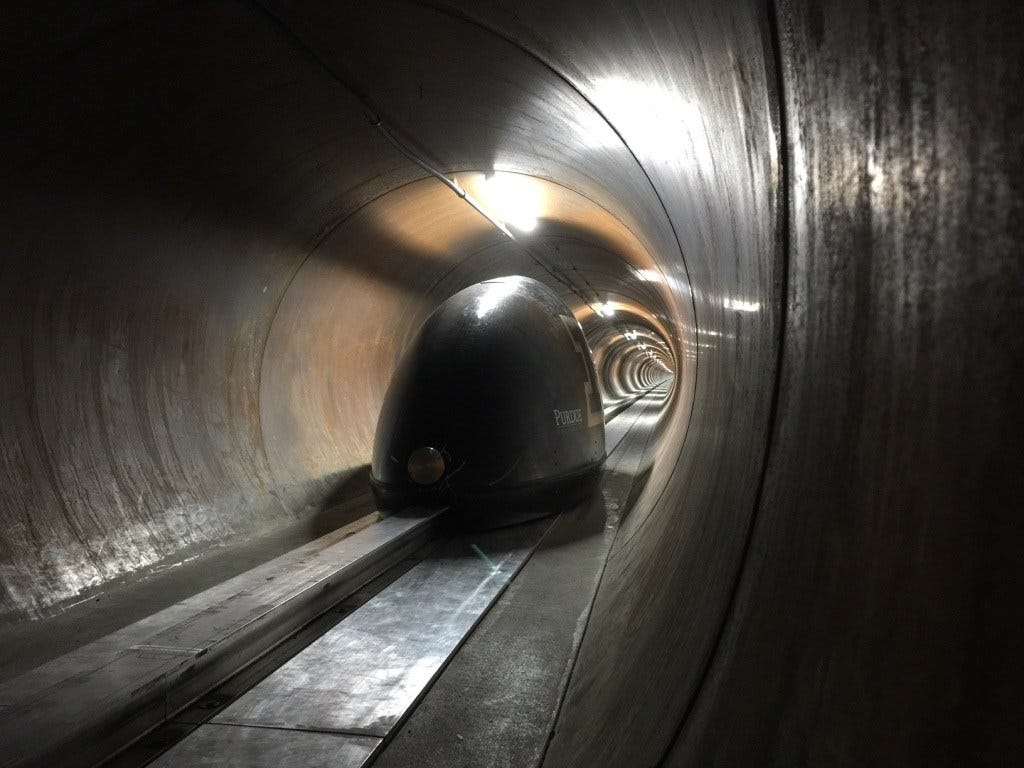Purdue Tests Hyperloop Pod on SpaceX Track
 Purdue's pod successfully completed its run on SpaceX's test track
Purdue's pod successfully completed its run on SpaceX's test track
Subscriber Benefit
As a subscriber you can listen to articles at work, in the car, or while you work out. Subscribe NowA team of Purdue University students is one of just seven throughout the country competing at the speed of sound. The undergrads built a pod that, ultimately, aims to be blasted through a tube at 700 mph. Called the Hyperloop, the concept is the brainchild of Elon Musk, the same mind behind Tesla and SpaceX. The Purdue Hyperloop team defeated about 20 others at a recent national competition, earning the right to test its first prototype pod—and push the envelope in transportation technology.
The Purdue team loaded its pod on a trailer and drove it to SpaceX’s headquarters in Hawthorne, California for the 27-team competition in late January. After a week of meeting various standards to whittle down the competition field, Purdue was one of seven university teams that qualified to test its pod on the SpaceX test track, which is about three-quarters of a mile long.
SpaceX founder Elon Musk proposed the futuristic concept in 2013, envisioning the Hyperloop as a mass transportation system that could move passengers at about 800 mph between two cities connected by a tube. The air inside the tube is sucked out, creating an extremely low pressure environment, or vacuum. Musk contends the concept could move cargo or passengers at a much lower cost than proposed high-speed rail projects.
Until this competition, Purdue’s pod existed only on paper. The team’s pod design qualified at a SpaceX competition last year to earn the right to build a prototype to test on the company’s track. The students say constructing their first-ever pod throughout the last year was thrilling, but also maddening.
“We were very happy to be the only pod [at the competition] that had a structure made fully of carbon fiber composite material. Manufacturing anything with carbon fiber is very difficult, but we decided to go with it because it’s lightweight,” says Purdue Hyperloop Project Manager Aaron Pikus, a senior studying aerospace engineering. “We certainly didn’t make our lives any easier with its design; it was really tough but also very rewarding. We learned a lot about how to design with real-world manufacturing in mind. Seeing everything come together and then run down that tube was very rewarding.”
The competition focused on engineering design; as one of seven teams that met certain standards, Purdue was able to see its pod in action for the first time, competing with the likes of Massachusetts Institute of Technology (MIT) and Virginia Tech. Purdue, like the six other qualifying teams, uses a magnetic system to make the pod levitate over the track.
Pikus says, during the test run, the pod traveled about 30 miles per hour and not in the vacuum environment, but all systems performed according to plan. Three other teams qualified to test their pods at 60 miles per hour in the vacuum environment. While Purdue didn’t reach this highest level, the team qualified for the next SpaceX competition this summer, which will test speed; Pikus believes 100 mph will be possible.
“Speed is the biggest challenge. We’ve been looking at ideas—some of them very crazy,” says Pikus. “It’s difficult for a reason; it takes a lot of power and very careful design work. We have to take what we have and try to simplify it, so we can accommodate more systems—the biggest one being some sort of propulsion system.”
Pikus notes there’s no shortage of Hyperloop critics, especially within the engineering field, but Purdue Hyperloop faculty advisor Dr. Guillermo Paniagua says the project seems to motivate students unlike any other.
“There are certain basic things students may see as ‘sunset technologies’; something that was already optimized many years ago, and now we’re doing only tiny improvements,” says Paniagua, an associate professor of mechanical engineering. “This concept of the Hyperloop is all fresh, all new and offers great potential for improvement. It brings excitement. The students are extremely motivated to give their best and clearly exploit their ingenuity.”
Paniagua likens the various pods at the recent competition to the first sketches of locomotives that engineers were imagining in the early 19th century.
“It’s great to see all of these different concepts and try to demonstrate them and learn the limitations,” says Paniagua. “Some of them will never see the light of day, but I think it’s very important in a university environment to be part of all this—the beginning of a new type of transportation.”
While he acknowledges some may think the Hyperloop is a crazy, unrealistic concept, he believes “this could be real” in less than 10 years, and like Purdue did with the transportation technologies of yesteryear, the university aims to blaze the trail—or tube.
Pikus admits some people think he’s crazy for working on the Hyperloop concept.
Pikus says the SpaceX headquarters was an exciting backdrop for the competition, and the employees even changed his mind about his future with the team.
Paniagua says the technology will likely be used to move cargo before passengers.
